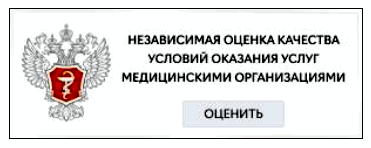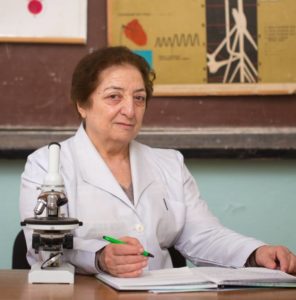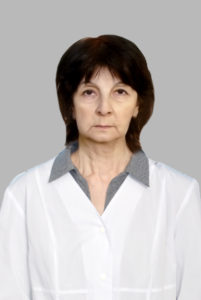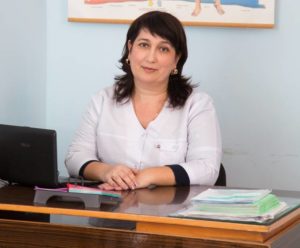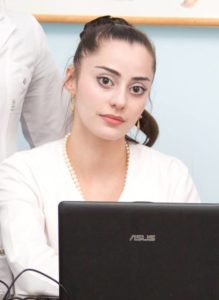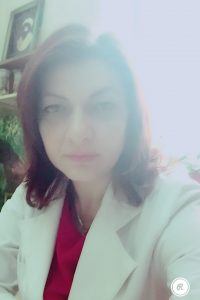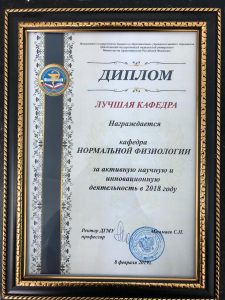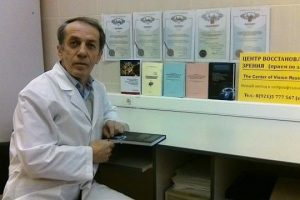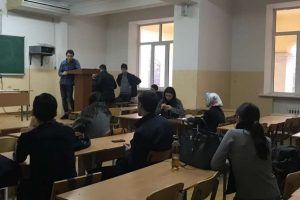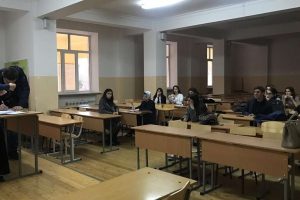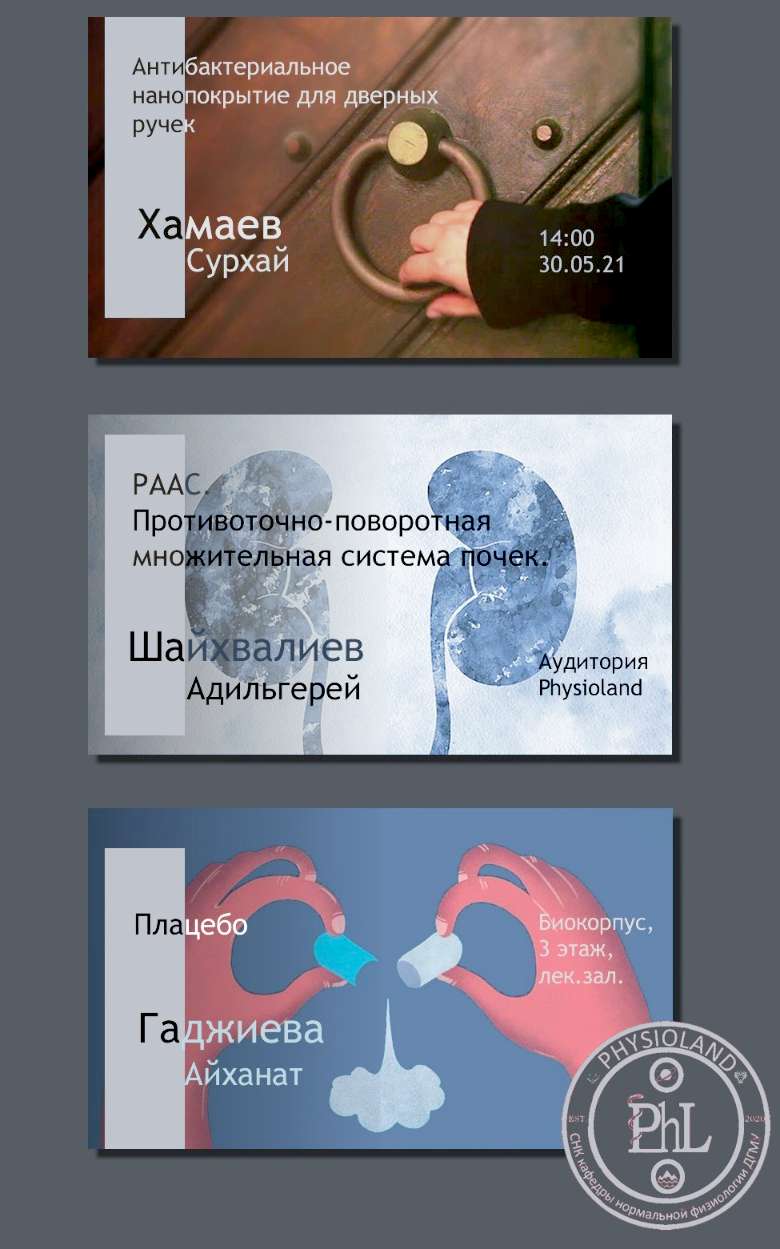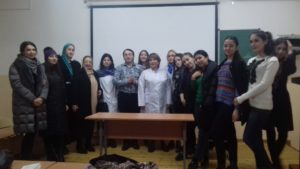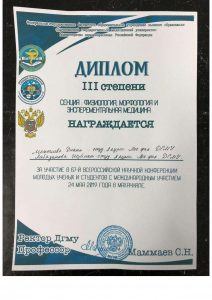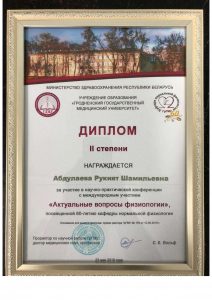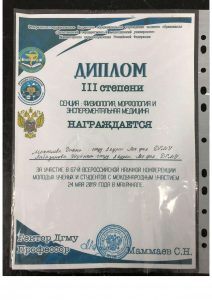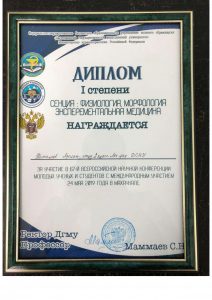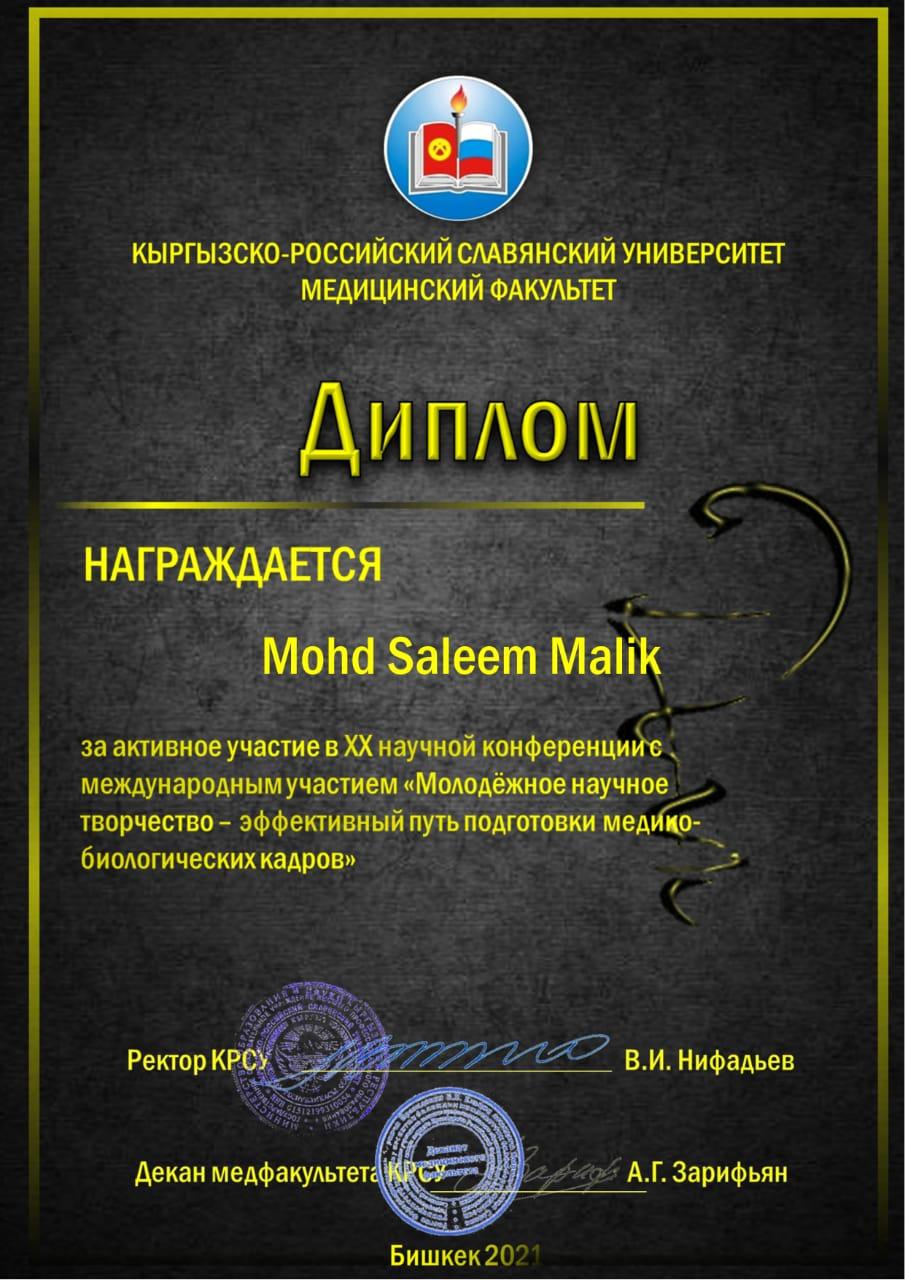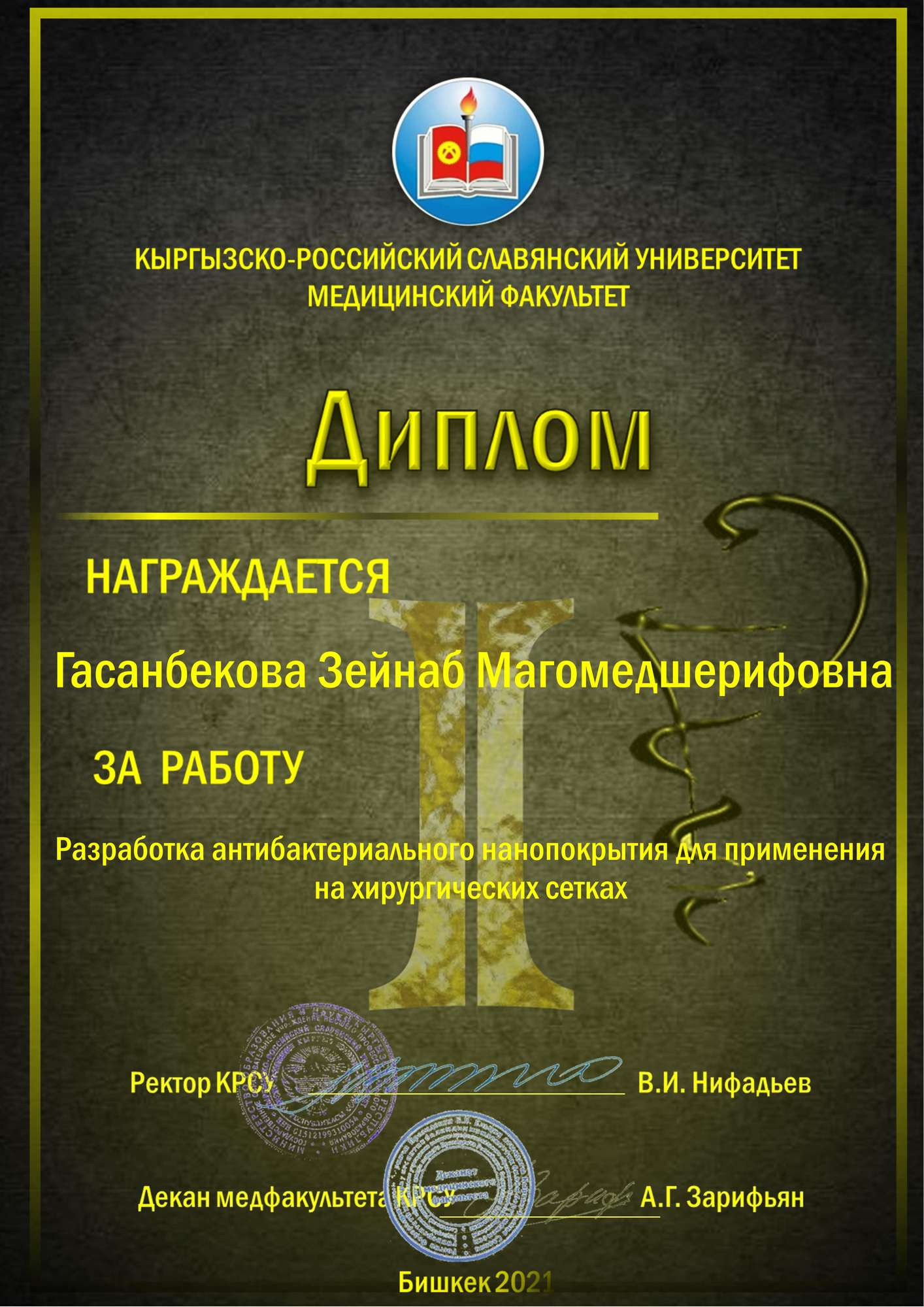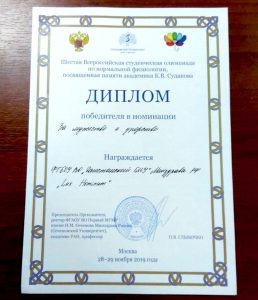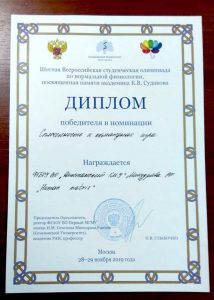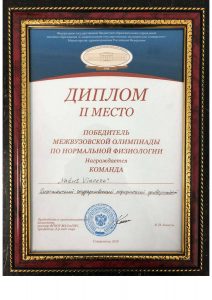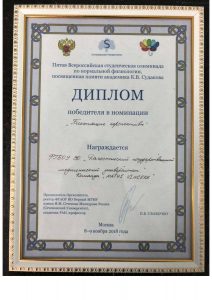Объявления
-
Памятки «Навигатор профилактики», разработанные Московским...
Уважаемые преподаватели и кураторы ФГБОУ ВО ДГМУ Минздрава России! В дополнение к ранее направленному письму от 13 октября 2022 г. № 06-14207/09-18/22 и в...
13.12.2022
2040
-
Список научных и педагогических сотрудников, относящихся к...
Список ППС
02.07.2024
24
-
Как вести себя при обстреле
25.06.2024
78
-
Что делать при угрозе ракетной атаки или обстрела...
25.06.2024
69
-
Новые учебные планы 2024 г.
Лечебный факультет Учебный план 2024-2030 г. Учебный план 2023-2029 г. Учебный план 2022-2028 г. Учебный план 2021-2027 г. Учебный план 2020-2026 г. Учебный план 2019-2025...
25.06.2024
1367
-
Очередное заседание Ученого совета
Уважаемые члены Ученого совета! 28 июня 2024 года в 16.00 состоится очередное заседание Ученого совета на втором этаже в зале заседания (Пл. Ленина, 1).
21.06.2024
185
-
Дайджест возможностей для молодых ученых
Продолжается прием заявок на конкурсы, гранты для поддержки молодых ученых, ниже представлены ссылки на активные конкурсы: Перечень
21.06.2024
69
-
Телефон для приема сообщений о коррупционных проявлениях:
68-32-80
-
Эл. почтовый ящик:
Ubdgmu@mail.ru
Department of Hominal Physiology
30.06.2021
333
Head of the department – Rahimov Razin Mirzekerimovich, MD, Professor, «Honored Scientist of RD»,
Address: 367020, RD Makhachkala, 1. Sh.Aliyeva Street, DSMU biocorpus
Phone/fax: 67-90-29
Email: physiologia_dgmu@mail.ru
Responsible for the website: Garunova R.E.
Staff
 Rahimov Razin Mirzekerimovich — M.D., Professor, “Honored Scientist of RD”, member of the United Russia Party (since 2009)
Rahimov Razin Mirzekerimovich — M.D., Professor, “Honored Scientist of RD”, member of the United Russia Party (since 2009)
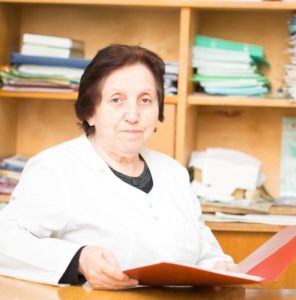 Nurmagomedova Khadizhat Akhmedovna
Nurmagomedova Khadizhat Akhmedovna
Associate Professor, Candidate of Biological Sciences, Honored Worker of Education, Veteran of labor, Head of the educational part of the department.
Associate Professor, Candidate of Medical Sciences, Honored Worker of Education of the RD, veteran of labor.
Candidate of Medical Sciences, Associate Professor.
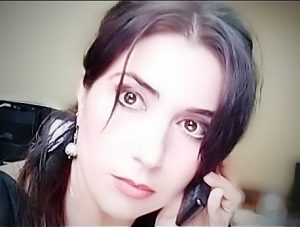 Abdullayeva Naida Murtazalievna
Abdullayeva Naida Murtazalievna
Candidate of Biological Sciences, Associate Professor.
Senior professor.
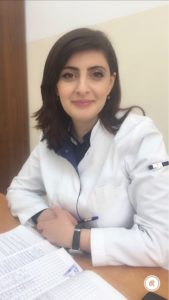 Zagirova Nuria Abdulkhalikovna
Zagirova Nuria Abdulkhalikovna
Assistant, Candidate of Medical Sciences.
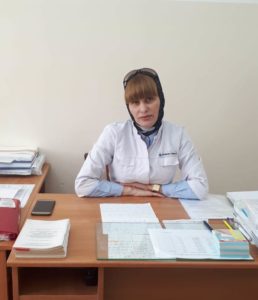 Suleymanova Raisa Gereikhanovna
Suleymanova Raisa Gereikhanovna
Assistant, Candidate of Medical Sciences.
Assistant.
Assistant, Candidate of Biological Sciences.
 Magomedova Makhruzhat Magomedovna
Magomedova Makhruzhat Magomedovna
Senior Laboratory assistant, Veteran of Labor.
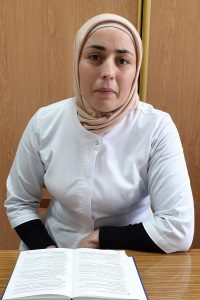 Abdulkhabirova Makka Saigidakhmedovna
Abdulkhabirova Makka Saigidakhmedovna
Laboratory assistant
History
The Department of Hominal Physiology at the Dagestan State Medical Institute was established in 1933. The first head of the department was E. L. Romel, an employee of the 2nd Moscow Medical Institute, who was invited to the DSMI to organize the Department of Physiology in the newly created university. During 4 years of work at the DSMI, he managed to establish both educational and research work at the proper level. In this position, he was replaced by N. N. Pavlov, who headed the department until 1941. During the next three years (1941-1944) the department was headed by Associate Professor A. A. Gavrilyuk, professors V. M. Borovsky, V. G. Budylin, N. A. Yudenich. From 1944 to 1962, the department was headed by Associate Professor L. V. Sokolov, who is still remembered today by our employees as a talented lecturer, an excellent teacher and a thoughtful experimenter. Under the leadership of L. V. Sokolov, a number of PhD theses were defended, and a student scientific circle worked. From 1962 to 1963, at various times, the department was headed by Professors N. S. Javadian and A.M. Gotsiridze. It is possible to note the great merits of all these scientists-associates, who, at the call of their hearts, broke away from their native lands and loved ones, came to help Dagestan in the formation of a young university.
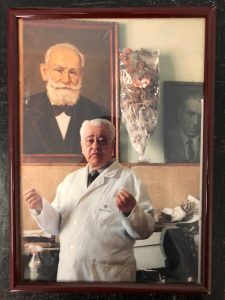 The new history of the department begins with the appointment of the head of the department, in 1963, associate professor, and then Professor G. G. Musalov. For the first time, a graduate of our “Alma mater”becomes the head of the department! After graduating from the Dagestan Medical Institute with a red diploma, Huseyn Hasanovich enters the postgraduate course at the Department of Normal Physiology of the 2nd Moscow State Medical Institute. His scientific supervisor is a world-renowned physiologist, associate fellow of the USSR Academy of Sciences, Professor E. A. Asratyan. This determined the direction of the young specialist’s scientific work. In 1956, he defended his PhD thesis on the topic: “The distribution of radioactive bromine and calcium in organs and tissues in dogs is normal and after cutting the spinal cord.” From 1956 to 1959, G. G. Musalov worked in Moscow, as the head of the team of physiological studies of the enterprise No. 1052, then as a leading doctor, a senior researcher. employee of the Research Institute of Test Aviation Medicine of the Air Force of the USSR Ministry of Defense. But a great desire for his native land and a great desire to benefit his institute led him to the Department of Physiology of the DMI in 1959. In 1964g. G. G. Musalov was elected associate professor, and in 1974. he successfully defended his doctoral dissertation on the topic “On the restoration of function and structure after complete transversal cutting of the spinal cord in animals”. Under his
The new history of the department begins with the appointment of the head of the department, in 1963, associate professor, and then Professor G. G. Musalov. For the first time, a graduate of our “Alma mater”becomes the head of the department! After graduating from the Dagestan Medical Institute with a red diploma, Huseyn Hasanovich enters the postgraduate course at the Department of Normal Physiology of the 2nd Moscow State Medical Institute. His scientific supervisor is a world-renowned physiologist, associate fellow of the USSR Academy of Sciences, Professor E. A. Asratyan. This determined the direction of the young specialist’s scientific work. In 1956, he defended his PhD thesis on the topic: “The distribution of radioactive bromine and calcium in organs and tissues in dogs is normal and after cutting the spinal cord.” From 1956 to 1959, G. G. Musalov worked in Moscow, as the head of the team of physiological studies of the enterprise No. 1052, then as a leading doctor, a senior researcher. employee of the Research Institute of Test Aviation Medicine of the Air Force of the USSR Ministry of Defense. But a great desire for his native land and a great desire to benefit his institute led him to the Department of Physiology of the DMI in 1959. In 1964g. G. G. Musalov was elected associate professor, and in 1974. he successfully defended his doctoral dissertation on the topic “On the restoration of function and structure after complete transversal cutting of the spinal cord in animals”. Under his 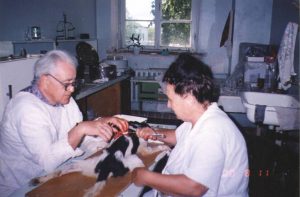 leadership, the department conducted a lot of educational, methodological and research work. At the same time, the active inventive activity of the employees was manifested: devices for studying morphological changes, electrophysiological and motor functions in the conditions of spinal cord injury were improved. During this period, the department was occupied by brilliant teachers and experimenters, associate professors M. A. Gusniev, L. M. Kiriakidi, A. T. Abakarov, Sh.M. Omarov, T. M. Abdurakhmanov, D. M. Aliyev, G. D. Khamidov. A great contribution to the organization of the laboratory for the study of tissue morphology was made by a wonderful teacher, a talented scientist-histologist, associate professor V. G. Dyatlova. The students of the circle showed themselves well in their research work: G. Starshenbaum, E. Uryev, A. Rasulov, D. Kilaberia, M. Shaidov, M. Yusupov, N. Mikheeva, G. Sagalova, etc., whose works were highly appreciated at student scientific conferences. Under the guidance of G. G. Musalov, associate professors A. O. Tavakov, R. R. Bilalova, A. A. Akhmedkhanova defended their PhD theses and work as teachers. During this period, the department opens a course in medical biophysics, for which a young specialist-bionic mathematician I. V. Kurochkin was hired.
leadership, the department conducted a lot of educational, methodological and research work. At the same time, the active inventive activity of the employees was manifested: devices for studying morphological changes, electrophysiological and motor functions in the conditions of spinal cord injury were improved. During this period, the department was occupied by brilliant teachers and experimenters, associate professors M. A. Gusniev, L. M. Kiriakidi, A. T. Abakarov, Sh.M. Omarov, T. M. Abdurakhmanov, D. M. Aliyev, G. D. Khamidov. A great contribution to the organization of the laboratory for the study of tissue morphology was made by a wonderful teacher, a talented scientist-histologist, associate professor V. G. Dyatlova. The students of the circle showed themselves well in their research work: G. Starshenbaum, E. Uryev, A. Rasulov, D. Kilaberia, M. Shaidov, M. Yusupov, N. Mikheeva, G. Sagalova, etc., whose works were highly appreciated at student scientific conferences. Under the guidance of G. G. Musalov, associate professors A. O. Tavakov, R. R. Bilalova, A. A. Akhmedkhanova defended their PhD theses and work as teachers. During this period, the department opens a course in medical biophysics, for which a young specialist-bionic mathematician I. V. Kurochkin was hired.
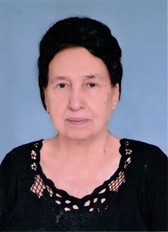 In 1967, Associate Professor T.S. Sulakvelidze came to the department from the North Ossetian Medical Institute, who organized a laboratory to study the regulation of kidney function and water-salt homeostasis. Under the direction of Tamara Sergeevna, methods of assessing vasopressin and oxytocin, the magnitude of diuretic activity of biological fluids, etc. were developed. Professor T. S. Sulakvelidze from 2014 to 2017 was the head of the Department of Hominal Physiology, now works as a professor-consultant in the scientific part of the DSMU. In 1969, Kh. A. Kebedmagomedova, a graduate of the Dagestan Medical Institute, who headed the biophysics course, returned from the 2nd MOLSMI after completing a postgraduate course in medical biophysics. In the same year, after finishing graduate school and defending his dissertation, V. V. Danielyan came from the Gorky Medical Institute, who did a lot for both the department and the institute. A wonderful lecturer and teacher, mentor of youth, who worked for a long time as dean of the preparatory faculty for foreign citizens. Twice he was on a business trip abroad to the Republic of Guinea, where he taught a course in Hominal physiology at the Medical Faculty of the University of Canakria. For his good work, Vladimir Vartanovich was awarded the Diploma of the USSR Embassy in the Republic of Guinea. The teachers of the department at that time were associate professor M. S. Alimetova, assistant M. H. Ramazanov. They were excellent teachers, competent, highly qualified specialists. The first applicant of the department was a graduate of DSMI Tavakov Abdulla Osmanovich. In 1965, he was accepted to the Department of Hominal Physiology as an assistant, where, under the guidance of associate Professor G. G. Musalov, he was formed as a teacher, scientist and educator of youth. His concentration, perseverance in achieving the goal, and analytical mind helped him quickly become a mature researcher. Combining teaching and scientific activities, he completed and successfully defended his PhD thesis on the topic “Dynamics of functional and morphological changes in the spinal cord of birds after its complete cross-cutting”. Since 1974. Tavakov A. O. becomes an associate professor of the department, worked as the head of the educational part of the department. For many years, he successfully carried out a large social burden, being an assistant to the dean of the medical faculty of the 2nd year. Associate Professor A. O. Tavakov was awarded the medal “Honored Worker of Education of the RD, had various honorary certificates. At the same time, Akhmedkhanova Aisha Abdullayevna works at the department — since 1973, first as an assistant, and since 1992 as an associate professor of the department.
In 1967, Associate Professor T.S. Sulakvelidze came to the department from the North Ossetian Medical Institute, who organized a laboratory to study the regulation of kidney function and water-salt homeostasis. Under the direction of Tamara Sergeevna, methods of assessing vasopressin and oxytocin, the magnitude of diuretic activity of biological fluids, etc. were developed. Professor T. S. Sulakvelidze from 2014 to 2017 was the head of the Department of Hominal Physiology, now works as a professor-consultant in the scientific part of the DSMU. In 1969, Kh. A. Kebedmagomedova, a graduate of the Dagestan Medical Institute, who headed the biophysics course, returned from the 2nd MOLSMI after completing a postgraduate course in medical biophysics. In the same year, after finishing graduate school and defending his dissertation, V. V. Danielyan came from the Gorky Medical Institute, who did a lot for both the department and the institute. A wonderful lecturer and teacher, mentor of youth, who worked for a long time as dean of the preparatory faculty for foreign citizens. Twice he was on a business trip abroad to the Republic of Guinea, where he taught a course in Hominal physiology at the Medical Faculty of the University of Canakria. For his good work, Vladimir Vartanovich was awarded the Diploma of the USSR Embassy in the Republic of Guinea. The teachers of the department at that time were associate professor M. S. Alimetova, assistant M. H. Ramazanov. They were excellent teachers, competent, highly qualified specialists. The first applicant of the department was a graduate of DSMI Tavakov Abdulla Osmanovich. In 1965, he was accepted to the Department of Hominal Physiology as an assistant, where, under the guidance of associate Professor G. G. Musalov, he was formed as a teacher, scientist and educator of youth. His concentration, perseverance in achieving the goal, and analytical mind helped him quickly become a mature researcher. Combining teaching and scientific activities, he completed and successfully defended his PhD thesis on the topic “Dynamics of functional and morphological changes in the spinal cord of birds after its complete cross-cutting”. Since 1974. Tavakov A. O. becomes an associate professor of the department, worked as the head of the educational part of the department. For many years, he successfully carried out a large social burden, being an assistant to the dean of the medical faculty of the 2nd year. Associate Professor A. O. Tavakov was awarded the medal “Honored Worker of Education of the RD, had various honorary certificates. At the same time, Akhmedkhanova Aisha Abdullayevna works at the department — since 1973, first as an assistant, and since 1992 as an associate professor of the department.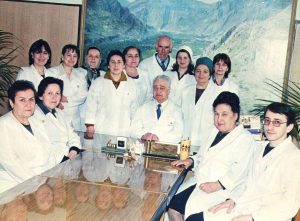
Under the guidance of Musalov G. G. and Sulakvelidze T. S., she successfully defended her PhD thesis “The main processes of urination in spinal animals” at the Kuban Medical Institute, Krasnodar.
In 1972, Izmailova A. Kh. came to work at the department. In 1975, she was sent to the target postgraduate school in Kazan. Since 1994, she has been working as an associate professor of the Department.
For more than forty years, M. M. Magomedova has been working as a senior laboratory assistant at the department, who, being a financially responsible person, oversees the equipment of laboratory work in practical classes. Gradually, young people are joining the recruitment team: R.E.Garunova, R.G. Suleimanova, G.A.Shamov, N.A.Sagirova, N.M.Nasukhov, who are very enthusiastic about laboratory classes, participate in the educational and methodical and public work of the department and the academy.
In 2018, the department was awarded a diploma by the university management.
The department trains students of medical, dental, pediatric, preventive medicine, and pharmaceutical faculties. The enumeration indicates a large volume and serious nature of lecture and laboratory work with students. The lecture course is taught by a professor and experienced associate professors. In the laboratory classes, a program course is carried out with the addition of students ‘ works in the plan of ERWS-SRWS and with the use of the cathedral card file and the abstract department. Due attention is paid to the development of practical skills. Much practical work is confirmed by printed publications. The department uses both traditional forms of control of students ‘ knowledge, and new ones-solving crosswords, conducting Olympiads, the results of which are summed up in the overall grades for the semester.
Training
The subject is taught in the first and second year. Practical classes are held in eight study rooms of the department. The training of students includes weekly lectures and practical classes throughout the academic year at each faculty (medical, pediatric, dental, preventive medicine, pharmaceutical).
The main direction of scientific research of the department
To study the properties of plasticity and adaptive-compensatory adaptation, their stimulation in the central nervous system on the experimental model of complete transverse cutting of the spinal cord in a comparative assessment of the conditions of a number of organs under these conditions, in particular, the water-releasing function of the kidneys, with the characterization of the role of vasopressin and oxytocin as the main levers of water-salt balance in the systemic and cerebrospinal circulation.
Another research area of the department is the study of the state of lipid peroxidation in various tissues and body fluids in the conditions of central nervous system injury. Interesting data have been obtained, which are also of applied importance in practical medicine.
In the development of new educational technologies, the department staff cooperates with other universities of the republic, speaking at educational conferences, systematically participating in the conferences of their academy.
Student’s scientific circle on Hominal Physiology
The work of the Scientific Student Circle is headed by Associate Professor Abdulaeva Naida Murtuzalievna.
The scientific student circle has been operating on the department since its founding. The best students who want to “discover something new” are interested in research work. Usually, members of the circle are students who study a subject beyond the curriculum; they are interested in scientific problems, new research techniques, obtaining “their” scientific facts, interpreting the results of research and their applicability in practice.
The Students’ Scientific Circle has been functioning at the department since its foundation. The best students who want to “discover something new” are keen on research work. Usually circle members are students who study the subject beyond the curriculum; they are interested in scientific problems, new research methods, obtaining “their own” scientific facts, interpretation of research results and their applicability in practice.
«Experimental psychology. FAQ».
On October 28, 2017, in the lecture hall of the biological building of the DSMU, as part of the student discussion club at the Department of Hominal Physiology, an extended meeting was held on the topic
«Experimental psychology. FAQ».
The curators and their groups of first-year students were also invited to the meeting. In total, 80 first-and second-year students of the pediatric, medical, dental and pharmaceutical faculties took part.
The meeting was conducted by the teachers of the Department of Hominal Physiology Harunova R. E. and Shamov G. A. Haji Abdulkadirovich Shamov is a very popular, practicing psychologist, a well-known personality, both in our republic and abroad. Within an hour, he answered a wide variety of questions from students.
The discussion was held in a free and democratic form, and any of the participants, whether a teacher or a student, could ask questions about practical physiology. Students asked various questions concerning child psychology, self-development and training, questions of personal growth, intricacies of relationships with peers and adults, questions of adaptation in new teams and this is not the whole list. The meeting was also attended by the staff of the Department of Hominal Physiology Associate Professors Izmaylov A.H. and Bilalov R.R., assistant of the Department of Microbiology Kasumov A.M. with their supervised groups.
Everyone who was present really liked this event, and the students were invited to be active and think about which of the interesting people they would like to meet next time.
